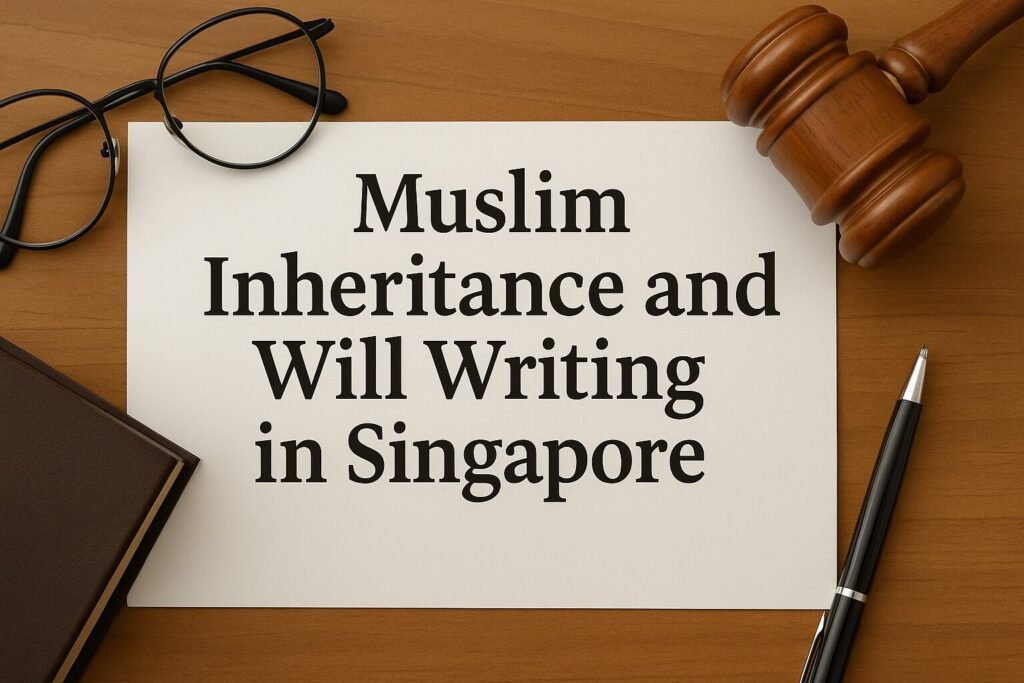A Little Story to Break the Ice
Picture Ahmad, sipping his kopi on a quiet evening, thinking: “Of course my estate goes to my family, right?” Spoiler: not always. Without a proper Wasiat (Muslim will), CPF funds, insurance payouts, and even his house under joint tenancy might bypass Faraid entirely — or worse, end up in the hands of unintended heirs or the Baitulmal.
This is where Islamic law, Singapore legislation, and a bit of foresight come together to save your family from legal headaches and heartbreak.
The Legal Bedrock: AMLA, MUIS, and the Syariah Court
Since 1 July 1968, under Singapore’s Administration of Muslim Law Act (AMLA), Muslim inheritance is governed by Islamic law (Faraid). Oversight is provided by:
- Syariah Court – Issues the Inheritance Certificate which determines who the rightful heirs are and their respective shares. Learn more here.
- MUIS – Advises on Islamic matters, manages the Baitulmal, and offers guidance on legacy planning. Read about MUIS Wasiat services.
Faraid – The Quran’s Built-In Estate Planning
Faraid sets fixed shares for eligible heirs: sons usually receive twice the share of daughters, spouses and parents have specific entitlements, and other relatives may also inherit.
If there are no eligible heirs, or assets remain undistributed, they can be channelled to the Baitulmal for community benefit.
Use MUIS’s Faraid Calculator to see how shares might be divided for your family.
Why You Still Need a Wasiat (Muslim Will)
Even with Faraid in place, a Wasiat gives you control over:
- Distributing up to one-third of your estate to non-Faraid beneficiaries — such as a non-Muslim spouse, adopted child, or charitable cause.
- Appointing an executor you trust, instead of leaving it to the court.
Wasiat rules in Singapore:
- You must be at least 21 and of sound mind.
- Only up to one-third of your estate can go to non-Faraid beneficiaries.
- It must be in writing, signed, and witnessed by two male Muslim witnesses who are neither beneficiaries nor their spouses.
- Keep it safe — in a lawyer’s office, Wills Registry, or a secure location your executor knows about.
Full guidelines here: MUIS Wasiat Information.
The Assets Faraid Does Not Touch
Many Muslims in Singapore are surprised to learn that the following bypass Faraid entirely unless you plan ahead:
- CPF savings – Goes to nominated beneficiaries.
- Life insurance payouts – Paid to the named beneficiaries.
- Joint tenancy property – Automatically passes to the surviving tenant.
Without proper nominations or a Wasiat, your intended beneficiaries could be left out entirely.
Sponsored Profile – Mid-Post Feature
Planning your estate with Islamic precision?
Partner with Shariah-savvy estate planning experts and law firms who understand Faraid, Wasiat, CPF nominations, and Syariah Court procedures. Secure your legacy for both this world and the next.
A Realistic Scenario
Sarah assumed her CPF savings would naturally go to her non-Muslim fiancé. She never made a nomination or wrote a Wasiat. When she passed, her CPF went into her estate, triggering a Faraid distribution process. Her fiancé, not being a Faraid heir, could only benefit if covered by the one-third discretionary portion — and only if a Wasiat had existed. Without it, he received nothing.
Lesson learned: hope is not a strategy.
Final Checklist – Ready to Write Your Wasiat?
- List all your assets: CPF, property, bank accounts, insurance, valuables.
- Note debts and religious dues (zakat, unpaid fidyah, funeral costs).
- Identify Faraid heirs and their shares (use the MUIS Faraid Calculator).
- Decide on your one-third discretionary bequests.
- Draft the Wasiat, ensuring compliance with witness requirements.
- Store your Wasiat securely and inform your executor.
- Review every five years or after major life changes.
A Note on Our Featured Partner

We invited Sample Advisor from Sample Estate Planning to ensure this article reflects real world practice in Muslim will writing and estate matters in Singapore.
What stood out was a calm, no frills approach and clear fees stated upfront. It makes planning easier for families who just want guidance they can trust.
Typical services: Muslim will drafting, Faraid guidance, CPF and insurance nominations, executor support.
Registration No: R0000000 • Office hours: Mon to Fri 9am to 6pm • Islandwide Singapore
DIY Tokyo with Muslim-Friendly, Magical & Money-Saving!


